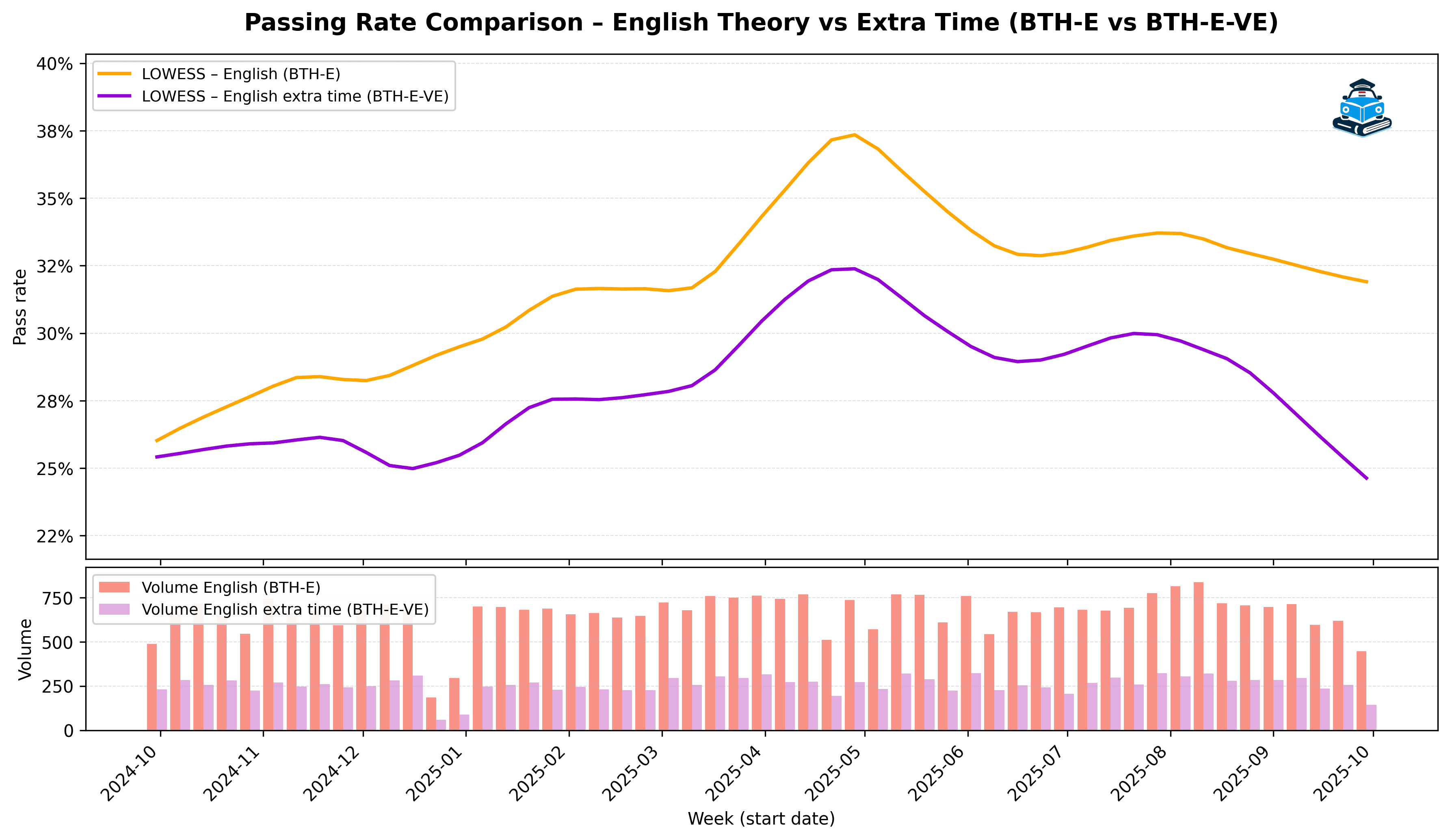License Pass Report · Category BTH-E / BTH-E-VE
English Theory vs Extra-Time Exam – How Do Pass Rates Compare?
Time horizon: 2024–2025
Published: November 15, 2025

Average pass rate
31.9%
Analyst note
Over 2024–2025, the normal English theory exam (BTH-E) averages a pass rate of 31.9%, while the extra-time version (BTH-E-VE) averages 28.1%. Both show a strong seasonal bump in April–May, likely driven by motivated retakers and concentrated preparation in spring.
1. Two English routes: normal vs extra time
This figure compares the normal English B theory exam (BTH-E) with the English extra-time exam (BTH-E-VE). Both lines are LOWESS-smoothed, so you see the underlying trend rather than every weekly wiggle, and the bars at the bottom show how many exams were taken each week.
Average pass rates over 53 weeks:
-
BTH-E – English theory exam
- Mean pass rate: 31.93%
- Most weeks between 29–34%, with extremes from 21.3% up to 42.7%.
- Total volume: 35,133 exams (about 663 per week).
-
BTH-E-VE – English theory extra time
- Mean pass rate: 28.09%
- Most weeks between 26–30%, ranging from 19.0% up to 35.9%.
- Total volume: 13,555 exams (about 256 per week).
So even with more time on the clock, the extra-time exam has a lower average pass rate than the normal English exam.
2. Seasonality and the spring spike
Both curves follow a similar seasonal rhythm:
-
Autumn and early winter:
Pass rates for both BTH-E and BTH-E-VE sit in the high 20s. The extra-time curve (purple) stays a couple of percentage points under the orange BTH-E line. -
Climb towards spring:
From January onwards, both lines trend upwards.- English normal (BTH-E) climbs toward 33–35%,
- Extra time (BTH-E-VE) moves toward 29–31%.
-
April–May spike – the “retake wave”
Around April and May, we see a clear peak in pass rates:- BTH-E reaches its yearly high, close to 38–39%.
- BTH-E-VE also peaks around 31–32%.
This is likely a retake pattern: many candidates who failed in winter return in spring, now better prepared. Driving schools often plan intensive courses in this period, and students have more time (fewer holidays, more routine), which all adds up to a higher slagingspercentage.
-
Summer and early autumn:
After May, both lines ease down again:- BTH-E slides back toward 31–33%,
- BTH-E-VE gradually falls below 30%, ending the period near 25–26%.
The gap between the two lines is fairly stable: extra-time candidates almost always pass less often than normal English candidates, even when both enjoy the spring boost.
3. Does extra time make the exam “easier”?
Based on these numbers: not really.
- Extra-time candidates start below the normal English pass rate and stay below for almost the entire year.
- The spring spike helps both groups, but it doesn’t eliminate the gap.
- Extra time seems to function more as an accessibility tool (for those who process information more slowly, or get stressed) than as a shortcut to a higher pass rate.
In other words:
Extra time helps candidates finish the exam, but it doesn’t magically turn a weak preparation into a pass.
Beter voorbereid zijn is nog steeds belangrijker dan extra minuten.
4. What this means for international candidates and driving schools
- If you are comfortable with English but struggle with time pressure or reading speed, BTH-E-VE can still be the right choice – but expectations should be realistic: the overall pass rate is around 28%.
- The best moment to take the exam (for both versions) seems to be April–May, when pass rates peak and many retakers succeed after extra study.
- For driving schools with a large international client base, the data suggests:
- Focus on strong theory preparation first,
- Use extra time as a supporting measure, not as the primary strategy to boost the slagingspercentage.
Overall, the English theory exams – both normal and extra time – remain challenging. But understanding their seasonality and the spring retake wave can help candidates and rijscholen make smarter choices about when and how to prepare for success.
Source: https://www.cbr.nl/nl/service/nl/artikel/1-oktober-2024-tm-30-september-2025